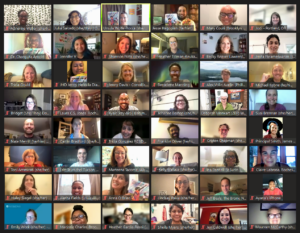
In September 2022, the Zinn Education Project welcomed 100 Teaching for Black Lives study groups selected to participate in a collective year-long inquiry into Teaching for Black Lives. With almost 200 applications, we heard from a wide range of educators across the country who are “craving tangible ways that we can make our classrooms center anti-racism, inclusion, and equity.”
Here are some of the hopes and goals expressed by study group members and coordinators.
I am looking forward to taking on a leadership role both through the fellowship and the creation of a study group so that my colleagues and I can create a more thoughtful, consistent and informed response to the challenges we are all facing in our classrooms and the school/district.
We are committed to equity and difficult conversations . . . this book has a very real and personal connection to us beyond that of a given alternative text on equity.
Budget constraints have led our district to have limited resources and a supply freeze, meaning that this book study is one of our best opportunities to spread supplemental material and lessons.
Our Teaching for Black Lives Study Group will give us a dedicated space to build on conversations around anti bias and anti-racism that our office has begun, learn from other groups doing similar work across the country, and actualize our learning in partnership with the teachers we support.
We’re looking forward to a space where we consistently and rigorously focus on how to coach teachers to support Black students’ success.
I am most looking forward to having the support of Teaching for Black Lives and the tools and materials it will offer. In the past, having to come up with and create all of the tools, resources, and materials to share with my school family has been a daunting challenge.
Thus, I am so excited with the possibility of being able to spend more of my time and energy in leading the group into deeper understanding, frameworks, and employment strategies.
Too often Black history is taught from a lens of oppression/saviorism and we must shift this narrative and illustrate the resistance, innovation, love, and liberation that has been present throughout history, but rarely shared as part of history.
Our goal with our study group is to disrupt this oppression and empower the voices of the forgotten.

